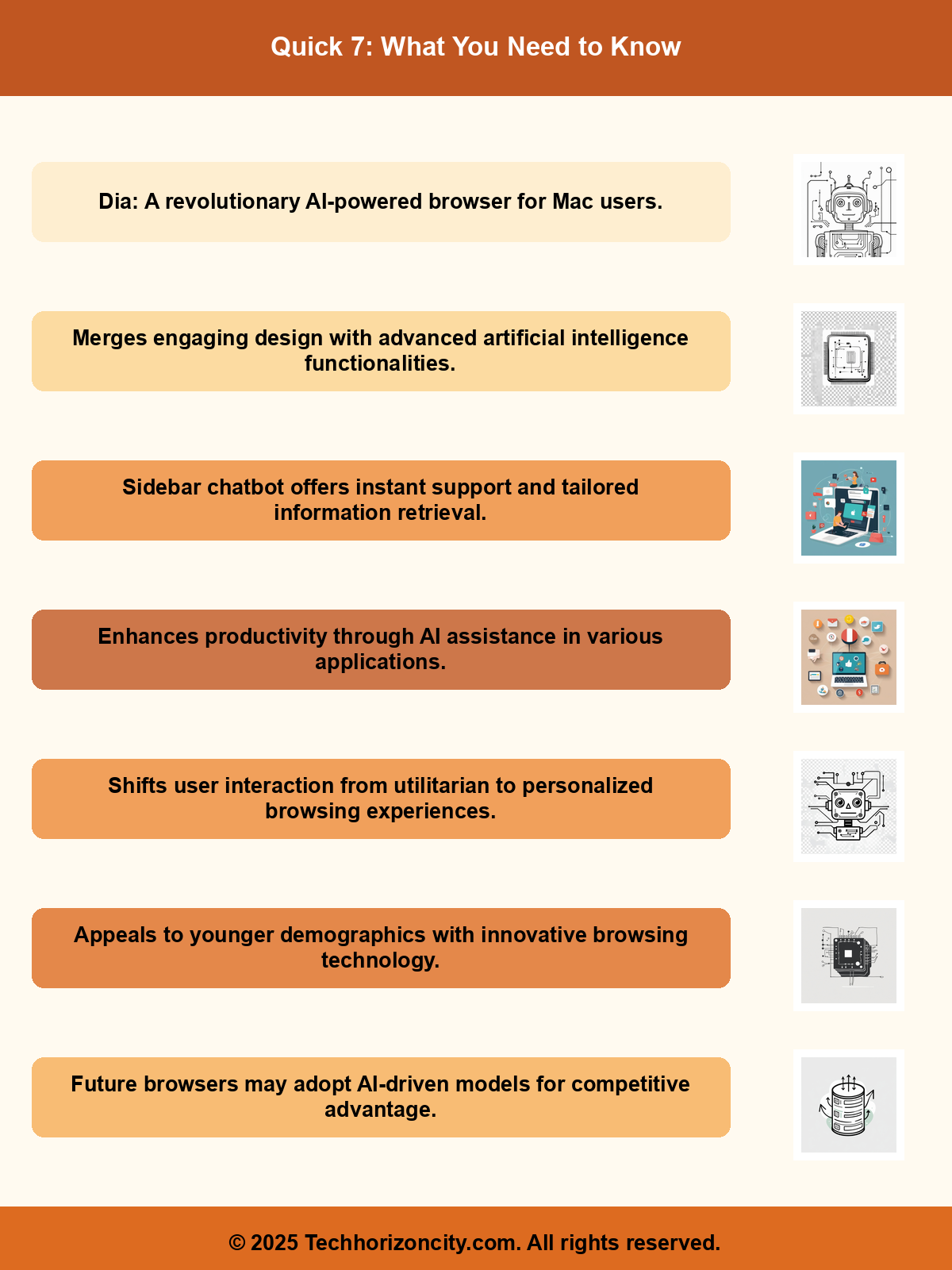Executive Summary
The Browser Company has ventured into a new realm of web browsing with the introduction of Dia, a browser that represents a significant shift from its predecessor, Arc. Designed specifically for Mac users and currently in beta, Dia aims to revolutionize online activities through the integration of artificial intelligence. By merging a visually appealing interface with advanced AI functionalities, Dia is positioned to become a pivotal player in the ongoing evolution of internet navigation. This article delves into the implications of Dia’s AI-centric features, the company’s strategic direction, and the broader impact on the tech industry.

Background Context
The Browser Company, under the leadership of CEO Josh Miller, has made waves with its innovative approach to web browsing. Arc, the company’s previous offering, garnered attention for its unique organizational tools, including side tabs and integrated bookmarks, which appealed to users looking for enhanced productivity. However, the tech landscape is rapidly evolving, with AI technologies capturing the imagination of users, particularly younger demographics. Recognizing this trend, The Browser Company has shifted gears to prioritize AI functionalities in its latest creation, Dia.
Currently only available in beta for Mac users, Dia has already begun to draw interest from early adopters. The browser’s design, reminiscent of Chrome but with more engaging aesthetics and animations, positions it as a modern alternative for users seeking a fresh browsing experience. Central to Dia’s offering is a sidebar chatbot that mimics the capabilities of ChatGPT, providing users with instant support and information retrieval tailored to their web activity.
Analysis of Implications
The integration of AI into Dia signifies a paradigm shift in how users interact with their browsing environment. The introduction of a chatbot that can analyze user behavior and assist with navigation is not merely a convenience but a potential game-changer for productivity. Early testers have already begun to leverage the AI for various applications, from meal planning to academic support, indicating a strong reception to the idea of AI as a coworker rather than just a tool.
This shift is particularly significant in the context of how we have traditionally viewed web browsers. For years, browsers were seen as utilitarian platforms for accessing the internet without much thought given to their potential for personalization and interaction. With Dia, The Browser Company is unlocking a new layer of engagement that allows users to tailor their online experience in ways that were previously unimaginable. This evolution aligns with the increasing demand for intuitive and interactive technology, suggesting that future browsers may need to incorporate similar AI-driven models to remain competitive.
Industry Impact Assessment
The advent of Dia comes at a time when the tech industry is witnessing the rapid adoption of conversational AI technologies. The success of ChatGPT and similar models has sparked a wave of interest in integrating such capabilities into everyday applications. As more users become accustomed to conversing with AI, their expectations will shift. They will begin to seek out platforms that not only facilitate their activities but also enhance their decision-making processes through intelligent assistance.
Moreover, Dia’s positioning within the market could catalyze a broader trend among tech companies to explore AI integration within their products. As the lines between browsing, searching, and socializing blur, companies that fail to adapt may find themselves at a disadvantage. The Browser Company’s venture into this space is not just an innovation for them; it could influence a rethinking of how all tech products approach user interaction and integration of AI.
Future Outlook
Looking ahead, Dia’s development signifies a promising trajectory for the future of web browsing. As the beta version progresses and user feedback is incorporated into ongoing iterations, we can anticipate enhancements that further refine the user experience. The potential for Dia to evolve into a fully-fledged digital assistant within the browser environment is significant. Imagine a future where browsing becomes more than just retrieving information but a dynamic, interactive experience where the AI learns and adapts to user preferences over time.
Additionally, as AI technology continues to advance, we may see Dia expand its capabilities beyond simple chat functionalities. Future iterations could incorporate more complex AI features, such as predictive browsing that anticipates user needs based on historical data, thus making web navigation not only seamless but also proactive. The Browser Company could lead the charge in redefining the browser as a central hub for all online activities, merging productivity tools, social interaction, and information retrieval into one cohesive experience.
Conclusion with Key Takeaways
The launch of Dia by The Browser Company marks a pivotal moment in the evolution of web browsers, driven by the integration of artificial intelligence. As the tech landscape shifts towards interactive and personalized experiences, Dia stands out as a beacon for what the future of browsing can look like. Key takeaways include:
- AI integration is set to redefine how users interact with web browsers, moving from passive tools to active partners in online activities.
- The success of Dia could inspire other tech companies to rethink their products and prioritize AI features to meet evolving user expectations.
- The design and functionality of Dia suggest a future where browsing is not only efficient but also highly engaging and tailored to individual needs.
As we watch Dia’s journey unfold, it will be fascinating to see how this innovative browser shapes the future of online interaction and influences the tech industry at large.
Disclaimer: This article was independently created based on publicly available information and industry analysis. While inspired by developments reported at www.theverge.com, all content, analysis, and opinions expressed are original and do not reproduce copyrighted material.
For the original reporting, please visit: https://www.theverge.com/web/685232/dia-browser-ai-arc
